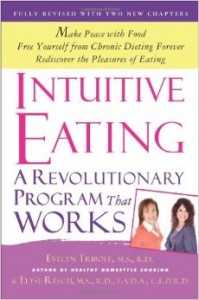 I will often hear from clients that what gets in the way of following a meal plan or eating in a non-dieting way is the fear that they cannot control themselves around food or are addicted to food. The book, Intuitive Eating, addressed the debate around food addiction and below is their research explaining many of the compulsive and impulsive behaviors around food.
I will often hear from clients that what gets in the way of following a meal plan or eating in a non-dieting way is the fear that they cannot control themselves around food or are addicted to food. The book, Intuitive Eating, addressed the debate around food addiction and below is their research explaining many of the compulsive and impulsive behaviors around food.
Survival of the Species
This brain-reward system is believed to be necessary in order to ensure human survival. This involves the brain chemical dopamine, which triggers both a pleasurable feeling and motivation behavior. Engaging in activities necessary to survival (such as eating and procreating) triggers a rewarding feel-good experience.
Hunger Enhances Reward Value
Hunger by itself enhances the reward value of food, through triggering more dopamine-related activity. For example, if you discover you are hungry, you might find yourself suddenly interested and motivated to cook a meal. Dieting (which can be a form of chronic hunger) also has this effect.
Pavlovian Conditioning
The dopamine effect could be attributed to Pavlovian conditioning (recall the classic study, in which Pavlov’s dog salivated at the mere ringing of a bell. This anticipatory salivation occurred because the dogs were conditioned to receiving a treat each time, after a bell rang). This is not addiction.
Dopamine Deprivation
Many pleasurable activities trigger dopamine, including socializing, hiking a nd playing games. The great majority of people we see in our practices, who binge eat, are often leading very unbalanced lives. These unbalanced lives “deprive” them of the dopamine benefits. When needs are not being met, food becomes even more enticing, more rewarding.
Music Lights up Dopamine Brain Centers
Recently, a new study showed that when people listen to music, it lights up the same region of the brain which has been implicated in the euphoric component of psychostimulants, such as cocaine (Salimpoor 2011). Just the anticipation of hearing the music lit up the dopamine brain centers. (Yet, we really don’t think you can make the case for ‘music addiction’!)
Food Addiction Studies are Limited and Flawed
The research on “food addiction” is too much in its infancy to be drawing any conclusions. In addition, the great majority of studies have been on animals. The limited research on humans has only been focused on brain-imaging studies with a very small amount of people and not much exclusion criteria (Benson 2010).
Yale Food Addiction Questionnaire
This has generated a lot of headline news. Yet, upon a closer look the questionnaire seems to actually be measuring compulsive eating or rebound eating from chronic dieting (Gearhardt 2009). Here is a sampling of questions:
– I find myself consuming certain foods even though I am no longer hungry. (Classic compulsive eating or distracted eating can cause this.)
– I worry about cutting down on certain foods (Classic compulsive eating or distracted eating can cause this.)
– I have spent time dealing with negative feelings from overheating certain foods, instead of spending time in important activities such as time with friends, family, work or recreation. (Classic compulsive eating or distracted eating can cause this.)
Studies Show Eating ‘Forbidden Food” Decreases Binge Eating
Finally, there are three studies to date, in which binge eaters eat their forbidden foods as part of the treatment process (Kristeller 2011, Smitham, 2008). Binge eating decreased significantly in all of these studies. If food addiction were an issue, you would not expect these types of results. Food addiction theory would predict increased binge eating, triggered by eating ‘addicting food,’ yet the opposite happened.
Shrein Bahrami, MFT | 2146 Union Street, San Francisco, CA 94123 | 415.595.8963
